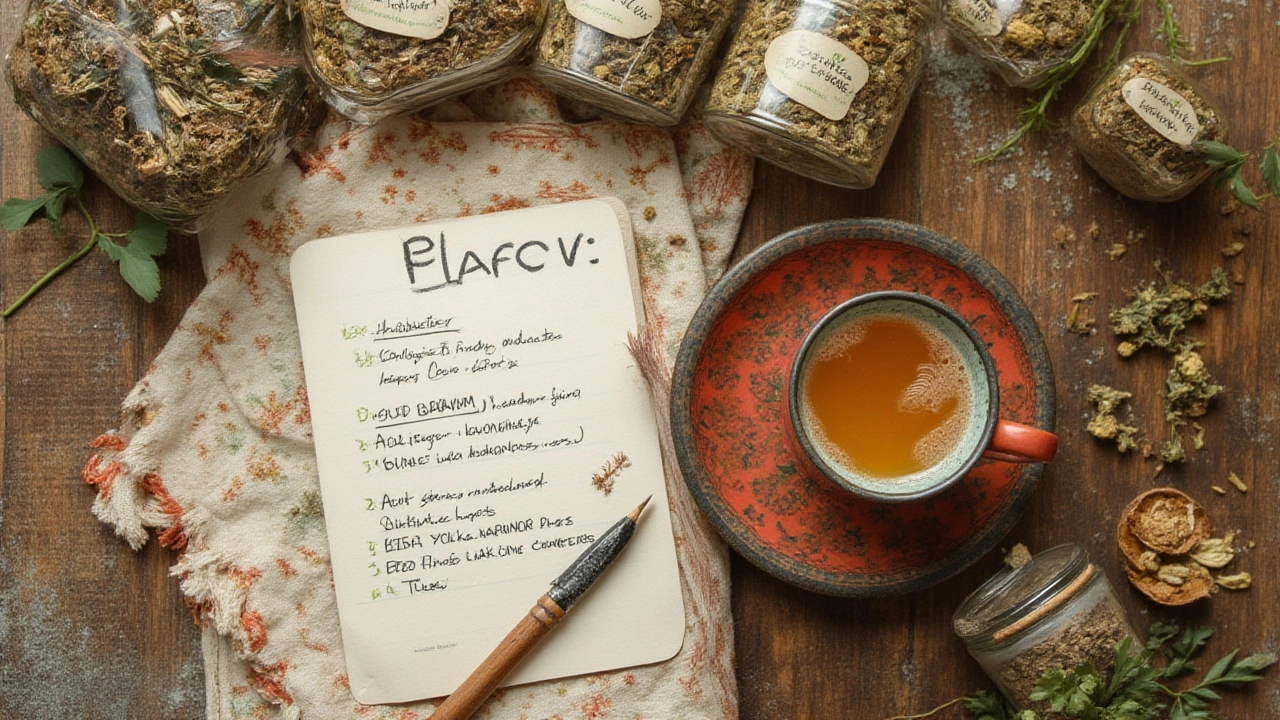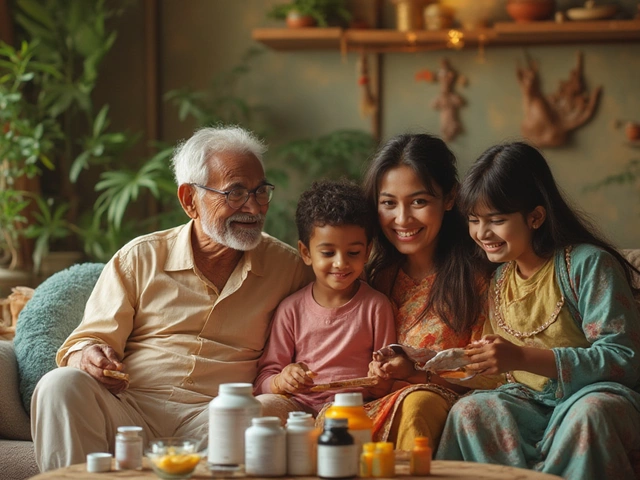
If you’ve battled anxiety, you know it’s more than a little worry. It can steamroll your plans, hijack your sleep, and leave you overthinking every detail. With endless options to ease the nerves—from yoga studios to prescription bottles—many people still ask, “Is there a true natural fix?” Herbal remedies have been around for thousands of years, but which one really packs the strongest anti-anxiety punch?
The Science of Anxiety: How Herbs Interact with Your Mind
Anxiety isn’t the same for everyone. For some, it’s sudden panic attacks; for others, it’s a constant buzzing worry. Your brain’s neurotransmitters, like GABA and serotonin, play a big role in all this. When things go sideways, you feel tense, restless, or just plain miserable. Many anti-anxiety herbs work by tweaking these chemicals, boosting calm and cutting down runaway thoughts.
Modern medicine has dug into the science behind several herbs. The curious thing? Researchers keep circling back to a few plant superheroes. The most famous one on almost every serious list is kava (Piper methysticum). Grown in the Pacific Islands, kava root has been used in traditional ceremonies for centuries to calm nerves, help people bond, and even deal with social situations that would make anyone sweat. What’s wild is that kava works by dialing up GABA activity—the same “chill out” neurotransmitter targeted by drugs like Valium. When GABA is up, anxiety is down.
Kava’s effects aren’t just hearsay. There’s an Australian study from the University of Queensland (published in 2013) showing kava extract helped people with generalized anxiety disorder reduce symptoms noticeably more than those taking a placebo. The participants didn’t just feel a bit better; several even went into full remission after a few weeks. That’s not something you see with every herbal tea bag.
But there’s a catch. Like most things that actually work, kava has some risk. High doses—especially mixed with alcohol or used long-term—have been linked to liver damage. That means if you have any liver issues, kava isn’t for you. Always talk to a doctor first if you’re adding it to your routine, especially if you’re already on meds or have a health condition. If you’re healthy, occasional use of kava extracts (from reputable brands only) is generally considered low risk. Drinking it nightly for months? That’s when problems might start.
Beyond kava, there’s ashwagandha, known as “Indian ginseng.” It’s one of the cornerstones of Ayurveda (India’s ancient health system). Scientists think ashwagandha helps the brain self-tune—by reducing cortisol (your body’s stress hormone) and boosting overall resilience. Several double-blind trials (like one published in the Journal of Clinical Psychiatry in 2019) show ashwagandha root extract can cut anxiety down by half in folks with chronic stress and mild anxiety. Unlike kava, ashwagandha is much gentler on the body, with very few side effects for most users.
Then there’s passionflower (Passiflora incarnata). It’s a favorite for those mild, “can’t switch off my brain” nights when you need to calm down but don’t want to get knocked out. Passionflower contains flavonoids that interact with the brain’s GABA system. Studies are more limited here, but small trials do support its use for short-term anxiety and even pre-surgery jitters.
Lemon balm, valerian root, and chamomile round out the main players. All three are mild, and work best for light anxiety, trouble sleeping, or the tension that comes at the end of a hectic day. Lemon balm is great in teas or tinctures and shines when blended with other calming herbs. Valerian root is more of an herbal “nightcap”—it’s effective but can leave you feeling sluggish if taken in large doses. Chamomile, the old-fashioned bedtime favorite, actually does have small calming effects—just don’t expect miracles if your anxiety is serious.
So if you’re after the strongest anti-anxiety herb, science actually leans toward kava, closely followed by ashwagandha for its long-term resilience benefits. Passionflower and the rest work, too, but their impact is usually milder.
Kava: The King of Calming Herbs
Kava isn’t something new. Pacific Islanders have used its root in welcoming rituals for almost 3,000 years. But only in the last few decades has it grabbed the global spotlight as the front-runner in fighting anxiety without synthetic drugs.
What’s in kava that makes it so effective? The answer: kavalactones. These unique plant compounds are the reason kava root goes from ceremonial drink to actual solution for anxious minds. Unlike caffeine or alcohol, they don’t directly pump you up or slow you down. Instead, they smooth out the electrical activity in your brain, so those spike-and-crash moments of anxiety mellow out into a calm but alert state. You don’t feel sedated, just less wound up.
There was a 2011 meta-analysis (published in the Cochrane Library) that reviewed multiple clinical trials on kava’s anti-anxiety effects. The punchline? Kava extract worked better than placebo for general anxiety. People reported real-life improvements: less racing heart, fewer sweaty palms, and a calmer mind in social settings. Some even compared it favorably to prescription anti-anxiety meds but without grogginess or mental fog the next day.
Still, kava comes with its warnings. European countries banned kava products briefly in the early 2000s because of rare but severe liver toxicity cases. It was later found that much of the problem was due to low-quality processing—sometimes other parts of the plant (not just the root) were used, or the wrong solvents extracted more toxic compounds. When kava is made properly and only the peeled root is used, the risk is much lower.
If you’re tempted to try kava, take it slow. The strongest products are usually standardized kava extracts in capsules. Start with the lowest dose (often around 60-120 mg kavalactones per day) and give your body time to adjust. Never mix kava with alcohol, heavy sedatives, or other substances that stress your liver. And remember—just because it’s a plant doesn’t mean more is better.
One surprising kava fact? The effects build up over days. Unlike popping a sedative, you might need to take kava consistently for a week to really feel steady improvements in anxiety. Kava’s not great as a quick “panic button” when anxiety spikes, but it shines for social anxiety, chronic worry, or tension that lingers for weeks at a time.
As for side effects, most people just notice a slight numbness in the mouth (if drinking traditional kava tea). Rarely, some folks get stomach upset or mild headaches. It goes without saying, if you feel anything weird, stop right away. There’s a reason doctors don’t recommend kava to anyone with liver disease, hepatitis, or those who drink heavily—it’s about safety first, not being a killjoy.
What if kava isn’t available where you live, or you’re worried about even tiny risks? That’s where other herbs come in.

Ashwagandha, Passionflower, and Friends: Comparing the Rest
Ashwagandha has exploded in popularity, popping up in everything from smoothie powders to stress-relief capsules. But this herb isn’t just hype. In India, it’s been trusted for centuries, used to help anxious minds, boost focus, and restore lost energy. Modern research is catching up. Randomized trials on real people—not just lab rats—show that ashwagandha root extract can lower anxiety by calming the body’s stress-response system. In one study from 2019 with medical students (a notoriously stressed-out group), daily ashwagandha dropped their anxiety scores by as much as 40 percent in under two months. With almost no side effects except for rare upset stomach or drowsiness, ashwagandha is now the go-to for people who want resilience, not just relaxation.
Passionflower, with its funky-looking blooms, used to be a secret of herbalists and grandparents who swore by old-fashioned remedies. Today, pharmacists in Germany—where herbal medicine is mainstream—regularly recommend passionflower extract for mild anxiety and sleeplessness. A double-blind study done in 2001 found that passionflower was nearly as effective as a low dose of oxazepam (a prescription tranquilizer) for regulating anxiety, with fewer hangover effects the next day. That’s impressive, especially if you want something gentle yet noticeable.
Lemon balm pops up in gardens everywhere, but it’s more than decoration. It shines in herbal teas and liquid extracts, best for calming jittery nerves without sedating you. An interesting note: in 2014, researchers at Northumbria University in the UK had healthy young adults take lemon balm extract or a placebo. The lemon balm group reported lower tension and performed better on memory tests, suggesting it not only relaxes but clears your mind, too. The effect isn’t dramatic, but it’s real—useful when you need to show up for work, not just chill out at home.
Valerian root, meanwhile, is usually the last stop before over-the-counter sleep aids. It knocks out mild anxiety and helps people fall asleep, though the smell is… let’s just say, not for the faint of heart. Chamomile remains everyone’s classic cozy cup before bed, and there’s actual science behind it. Multiple clinical studies have found that chamomile extract can mildly but measurably reduce symptoms in generalized anxiety disorder. It’s safe, easy on the stomach, and a staple for those who want something super gentle.
If you’re the kind of person who loves mixing and matching, herbalists often recommend blending these herbs for a customized “calm cocktail.” For example, a common combo for daytime anxiety is ashwagandha with lemon balm. If sleep is your main issue, valerian and passionflower or chamomile might be a better fit. Just be careful not to mix too many sedating herbs at once—stick to two or three and test how your body reacts.
A quick tip: always buy herbs from reputable brands. Look for products that have been tested for purity and potency. Herbs can be contaminated with heavy metals or pesticides if not grown and processed correctly. If you see an oddly cheap deal online, it’s probably not worth the risk.
Pregnant women, kids, and people on medication need to be extra cautious. Some herbs—like valerian and passionflower—can interact with common prescription drugs. When in doubt, check with your doc first.
How to Use Anti-Anxiety Herbs Safely and Effectively
Once you’ve settled on a herb (or a blend), how you use it makes all the difference. Capsules and tinctures are the most common because the dosing is predictable. Herbal teas are nice if you want something relaxing as a nightly ritual, but most research uses higher doses than you’ll find in pre-packaged tea bags. If you want results like those in the studies, look for standardized extracts that specify the active ingredients (like kavalactones in kava or withanolides in ashwagandha).
Don’t expect magic overnight. Most herbs—even the strongest—take at least a few days to kick in. Consistency is key. Take your chosen product at the same time each day for best results. Many people notice the most dramatic changes after three to four weeks.
It’s tempting to stack multiple calming products when anxiety is stubborn, but piling on too many supplements can backfire. Too much GABA-boosting may leave you sleepy, dizzy, or off-balance. Stick to one or two herbs at a time, add lifestyle habits like daily walks or deep breathing, and pay attention to how you feel.
Never use herbs as an excuse to avoid professional help. If your anxiety feels out of control, affects your work, relationships, or makes you dread getting out of bed, see a mental health pro. Herbs work best as supportive tools—not miracle cures. Sometimes a combined approach, using the right herb for daily support and therapy or medication for the heavy lifting, is what finally makes things manageable.
Another important detail: quality matters. Herbal supplements aren’t as tightly regulated as prescription drugs. Check the label. Words like “standardized extract,” “third-party tested,” or certifications for purity are all green flags. If in doubt, ask a naturopath or pharmacist with experience in herbal supplements what brands they trust. And always start at the lowest recommended dose—side effects are rare but they do happen, so there’s no need to rush.
Finally, remember that your body is unique. What calms your friend might rev you up, and vice versa. It can take some experimenting (and a little patience) to find your personal “strongest anti-anxiety herb.” Kava might be king on paper, but for you, a gentler herb like ashwagandha or passionflower might just be the ticket.





